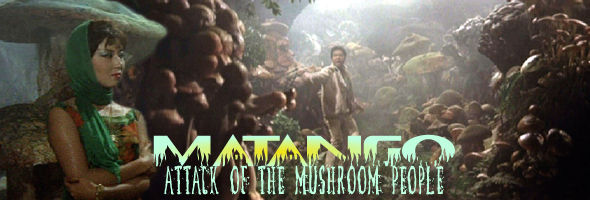
Color, 1963, 90m. / Directed by Ishir˘ Honda / Starring Akira Kubo, Kumi Minzuno, Miki Yashiro, Hiroshi Koizumi, Yoshio Tsuchiya, Kenji Sahara / Media Blasters (US R1 NTSC) / WS (2.35:1) (16:9) / DD5.1
Told in flashback by a traumatized man in a holding cell, the story follows the plight of seven pampered passengers aboard a Tokyo liner who must land on a deserted island after being swept up in a violent storm. Rations from the boat are limited, and even worse, the island provides little in the way of nourishment... apart from hordes of mushrooms big and small growing everywhere. The remains of a settlement from
In the best monster fashion, Matango keeps most of its horrors under wraps for most of the running time and instead diverts the audience with a high-spirited musical number, dramatic character interplay, and a wonderfully escalating sense of dread that pays off on an appropriately apocalyptic note. With most of the focus placed on their characters and their plight rather than the monsters (years before Lost, by the way), the story moves gradually into increasingly dark, hallucinatory terrain until the final scenes play out like a very macabre fairy tale. Many of the actors will be familiar from other monster outings including Akira Kubo (Destroy All Monsters), Kumi Minzuno (Godzilla: Final Wars), Hiroshi Koizumi (Dr. Chűj˘ from Mothra), and even Kurosawa regular Yoshio Tsuchiya. All of the actors clearly have fun getting some juicy, morbid material to work with and make the potentially goofy story concept work without a hitch.
Media Blasters'
Color, 1957, 88m. / Directed by Ishir˘ Honda / Starring Kenji Sahara, Yumi Shirakawa, Momoko Kochi, Akihiko Hirata, Takashi Shimura / Media Blasters (US R1 NTSC) / WS (2.35:1) (16:9) / DD5.1
With a slick, glittery, colorful look
Media Blasters' rousing special edition presents the slightly longer Japanese cut of the film (restoring four bits of excised footage to the climax), with a
Other extras include a hefty photo gallery divided into three sections (stills, production designs, storyboards) and the original Japanese trailer, as well as promos for more upcoming Toho monster releases. Bring on Varan!
Saddled with the ridiculous title of Attack of the Mushroom People for its American TV showings by the ever-reliable AIP, this low-key, poetic, and strangely
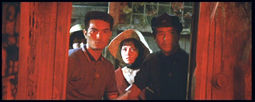 haunting monster outing for frequent Godzilla director Ishir˘ Honda has long suffered from numerous indignities, including a particularly undeserved, sneering attack from the Medved Brothers in their Golden Turkey series. Now that Japanese genre cinema has finally earned a more respectable international reputation over the past decade, this fondly remembered but often mocked bit of atmospheric spookiness can finally be appreciated in its first viable home presentation.
haunting monster outing for frequent Godzilla director Ishir˘ Honda has long suffered from numerous indignities, including a particularly undeserved, sneering attack from the Medved Brothers in their Golden Turkey series. Now that Japanese genre cinema has finally earned a more respectable international reputation over the past decade, this fondly remembered but often mocked bit of atmospheric spookiness can finally be appreciated in its first viable home presentation.
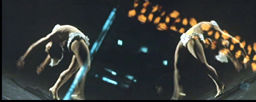 a group of radiation scientists provides a few clues, and when one of the passengers decides to defy the possibility of poisoning and scarfs down some of the fungi, the results are extremely unpleasant. Soon the number of survivors begins to dwindle as the island's deadly secrets begin to come to light...
a group of radiation scientists provides a few clues, and when one of the passengers decides to defy the possibility of poisoning and scarfs down some of the fungi, the results are extremely unpleasant. Soon the number of survivors begins to dwindle as the island's deadly secrets begin to come to light...
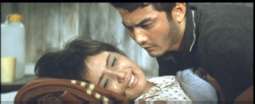 very welcome release of Matango sports a crisp and fully letterboxed transfer that easily obliterates those horrendous scanned TV prints and glitchy bootlegs. Obviously culled from a Japanese video source, the visual presentation is excellent but does feature those telltale pale black levels that need to be adjusted a bit on your monitor, but the effort is worth it. The soundtrack features both 5.1 and mono mixes of the dubbed Engg) or the preferable original Japanese track (mono). The optional English subtitles are very literate and respectful. Also included is an audio commentary (in Japanese with optional English subtitles) featuring Kubo's memories of the making of the film, which he regards his one of his better monster outings; he also offers a few nifty anecdotes about the Japanese studio system at the time and the process of landing roles in films regarded as hot export prospects. Also included is a video interview with effects cinematographer Teruyoshi Nakano, who talks about the various processes used to bring the film's otherworldly visuals to life, accompanied by numerous FX shots from the set. In the strangest extra, writer Masami Fukushima contributes a spoken word piece based on the film. The package is rounded out by the film's Japanese trailer and additional trailers for future titles like Gappa, Dogora, The Mysterians, and Varan the Unbelievable.
very welcome release of Matango sports a crisp and fully letterboxed transfer that easily obliterates those horrendous scanned TV prints and glitchy bootlegs. Obviously culled from a Japanese video source, the visual presentation is excellent but does feature those telltale pale black levels that need to be adjusted a bit on your monitor, but the effort is worth it. The soundtrack features both 5.1 and mono mixes of the dubbed Engg) or the preferable original Japanese track (mono). The optional English subtitles are very literate and respectful. Also included is an audio commentary (in Japanese with optional English subtitles) featuring Kubo's memories of the making of the film, which he regards his one of his better monster outings; he also offers a few nifty anecdotes about the Japanese studio system at the time and the process of landing roles in films regarded as hot export prospects. Also included is a video interview with effects cinematographer Teruyoshi Nakano, who talks about the various processes used to bring the film's otherworldly visuals to life, accompanied by numerous FX shots from the set. In the strangest extra, writer Masami Fukushima contributes a spoken word piece based on the film. The package is rounded out by the film's Japanese trailer and additional trailers for future titles like Gappa, Dogora, The Mysterians, and Varan the Unbelievable.
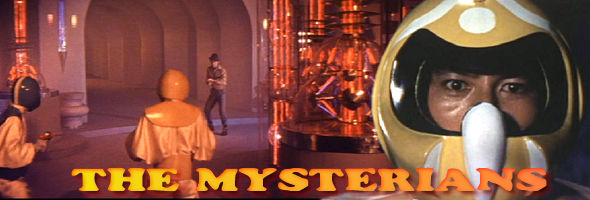
In this lavish change of pace from his pioneering monster outings Godzilla and Rodan, director Ishir˘ Honda ventured into outer space terrority for this dizzying
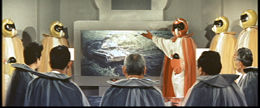 saga that begins with a bang and rarely pauses for breath. The mayhem starts when a small Japanese town is laid to waste by an unseen force, and the intervening military discovers a giant robotic bird created by the Mysterians, a caped race from the planet Mysteroid who have established a dome-like structure on Earth. When the government and scientists decide to approach the strange beings, they receive a tantalizing offer: grant a small amount of land and some earth women to help them replenish their race, and they will cohabit in peace. Unfortunately the humans feel such an offer is beyond the realm of acceptability, and soon a full-scale war erupts with the fate of manking hanging in the balance.
saga that begins with a bang and rarely pauses for breath. The mayhem starts when a small Japanese town is laid to waste by an unseen force, and the intervening military discovers a giant robotic bird created by the Mysterians, a caped race from the planet Mysteroid who have established a dome-like structure on Earth. When the government and scientists decide to approach the strange beings, they receive a tantalizing offer: grant a small amount of land and some earth women to help them replenish their race, and they will cohabit in peace. Unfortunately the humans feel such an offer is beyond the realm of acceptability, and soon a full-scale war erupts with the fate of manking hanging in the balance.
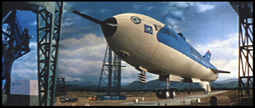 that will look familiar to any Inframan fan, The Mysterians is a pivotal Japanese science fiction film and established a solid template for the following decades' worth of superhero aliens infiltrating Earth culture for their own ends, either good or evil. Though ostensibily passed off as a kiddie film in America, this is rousing fun for anyone with an appreciation for comic books or a good space yarn; Honda piles on the incidents with tons of laser blasts, flying ships, and gaudy outfits, with character development taking a firm backseat. The catchy, action-packed score by Akira Ifukube is a notable departure from his more somber work on Godzilla and has justifiably become a fan favorite. Never one to shy away from wedging social issues into his pulp concoctions, Honda makes some prescient points about the futility of warfare that still bear an eerie resonance today as random violence and squabbling over land result in seemingly endless feuds for dominance.
that will look familiar to any Inframan fan, The Mysterians is a pivotal Japanese science fiction film and established a solid template for the following decades' worth of superhero aliens infiltrating Earth culture for their own ends, either good or evil. Though ostensibily passed off as a kiddie film in America, this is rousing fun for anyone with an appreciation for comic books or a good space yarn; Honda piles on the incidents with tons of laser blasts, flying ships, and gaudy outfits, with character development taking a firm backseat. The catchy, action-packed score by Akira Ifukube is a notable departure from his more somber work on Godzilla and has justifiably become a fan favorite. Never one to shy away from wedging social issues into his pulp concoctions, Honda makes some prescient points about the futility of warfare that still bear an eerie resonance today as random violence and squabbling over land result in seemingly endless feuds for dominance.
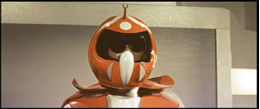 mostly satisfying anamorphic transfer that, like Matango, benefits from a little contrast adjustment to bring the black levels down. The widescreen compositions are essential throughout as Honda giddily plays around with the very wide framing, selling off the new "TohoScope" format which would become a staple of the company's output for most of their big future productions. On the audio side you get a new 5.1 English dubbed track (not quite as dismal as the orignal RKO '60s mix but still no great shakes), a surprisingly realistic 5.1 mix of the Japanese version, and the original Japanese mono mix. Also included is an audio commentary with effects men Koichi Kawakita and Shinji Higuchi (the former worked on the film and certainly had his work cut out for him!), in Japanese with optional English subtitles.
mostly satisfying anamorphic transfer that, like Matango, benefits from a little contrast adjustment to bring the black levels down. The widescreen compositions are essential throughout as Honda giddily plays around with the very wide framing, selling off the new "TohoScope" format which would become a staple of the company's output for most of their big future productions. On the audio side you get a new 5.1 English dubbed track (not quite as dismal as the orignal RKO '60s mix but still no great shakes), a surprisingly realistic 5.1 mix of the Japanese version, and the original Japanese mono mix. Also included is an audio commentary with effects men Koichi Kawakita and Shinji Higuchi (the former worked on the film and certainly had his work cut out for him!), in Japanese with optional English subtitles.
